Modules (Master/Doctorate in Transport)
Detailed content of the modules of the Master/Doctorate in Global Transport
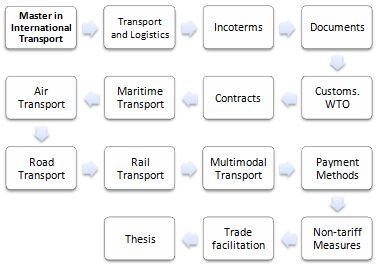
Detailed content of the Modules and subjects of the:
Master in International Transport.
Doctorate in Global Transportation & Logistics.
ECTS = European Credit Transfer and Accumulation System
Subjects of the Professional Master/Doctorate in Global Transport


Introduction to the International Transport and Logistics (5 ECTS).
- Introduction to the International Logistics and International Trade
- International transport chain
- Authorized Economic Operator
- Selecting a mode of International Transport
- Costs and insurance of International Transport
- Transport Documents related to International Trade
- Export Packaging
Containers and international transport.
- Customs Convention on Containers
- International Convention for Safe Containers
- Convention Relating to Temporary Admission
International Federation of Freight Forwarders Associations (FIATA).
- Negotiable Combined Transport Bill of Lading (FBL)
- Electronic FIATA Bill of Lading
- FIATA Multimodal Waybill FWB
- Forwarders Certificate of Receipt (FIATA FCR)
- Forwarders Certificate of Transport (FCT)
- Warehouse Receipt
The objectives of the subject “Introduction to International Transport and Logistics” are:
- To have a global vision of the logistics and international transport applied to the International Trade
- To understand the functioning of the global transport chain
- To know the different techniques of export packaging and the importance of the Containers
- To understand the basic concepts related to the documents, costs and insurance of International Transport
- To analyze the main documents of the FIATA
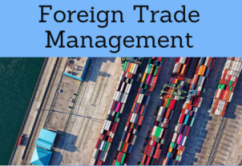
Incoterms (2 ECTS)
- Introduction to the Incoterms
- What are the Incoterms® 2020?
- Key changes to the Incoterms® 2020
- The Review of the Incoterms® FCA (Free Carrier)
- The change from DAT (Delivered at Terminal) to DPU (Delivered at Place Unloaded)
- Different levels of insurance coverage under CIF and CIP
- Associated costs for each Incoterm (article A9 / B9)
- Analysis of the Incoterms® 2020
- Incoterms® 2020 and international transport
- Incoterms® 2020 for sea and inland waterway transport: FAS (Free Alongside Ship) - FOB (Free On Board) - CFR (Cost and Freight) - CIF (Cost, Insurance & Freight)
- Incoterms® 2020 for any mode of transport: EXW (Ex Works) - FCA (Free Carrier) - CPT (Carriage Paid To) - CIP (Carriage and Insurance Paid to) - DAP (Delivered At Place) - DPU (Delivered at Place Unloaded) - DDP (Delivered Duty Paid)
- How are they used?
- Criteria for selection of the Incoterms® 2020
The objectives of the subject “Incoterms® 2020” are the following:
- To understand the importance of the Incoterms® 2020 in Foreign Trade
- To know which Incoterms® 2020 are the most suitable for the different types of International Transport
- To know how to calculate the export prices based on the Incoterms® 2020
- The risk, cost and necessary procedures according to the selected Incoterm
Foreign Trade Documents (1 ECTS).
- The role of the documents in the international transport and International Trade
- International transport documents
- Commercial documents (proforma, invoice, packing list...)
- Origin documents
- Other Foreign Trade Documents
The objectives of the subject “International Trade Documents” are the following:
- To know the function of the main documents used in imports and exports
- To know how to fill them out properly
- To know how to perform the check-list of the Foreign Trade Documents
Customs. World Trade Organization (WTO) (4 ECTS).
- Customs in Foreign Trade
- Customs classification
- Customs regime
- The role of the customs agent
- Customs clearance
- Inspection of the products at customs
- Origin of products
- Market Access database (EU)
- Harmonized System (HS)
- Rules of Origin
- Agreement on Rules of Origin of the WTO
- Trade facilitation
- Customs Procedures
- SAFE Package
- Kyoto Convention
- The World Trade Organization and Customs
- Rules for the customs valuation of products
- Customs Valuation Methods:
- Transaction value
- Identical or similar goods
- Deductive or computed method
- Fall-back
- Rules of Origin
- Import licenses
- The WTO Agreements on Technical Barriers to Trade (TBT), Sanitary and Phytosanitary Measures (MSF), Pre-shipment Inspection
The objectives of the subject “Customs” are the following:
- To understand the customs procedures in Foreign Trade, the different commercial regimes and the methods of product classification
- To learn about the fundamental concepts related to the customs: customs clearance, customs valuation, non-tariff barriers and obstacles, pre-shipment inspection, origin of goods, Harmonized System, customs processes..
- To know the process of importing a product and the customs regimes
- To understand the functions of the WCO and the WTO in relation to the customs
International Contracts (3 ECTS).
- International Contracts in foreign trade
- Risks associated to the International Trade
- Risk minimization instruments
- Guarantees in Foreign Trade
- United Nations Convention on Contracts for the International Sale of Goods (1980)
- Convention on the Limitation Period in the International Sale of Goods
- Vienna Convention
- Hague Conference on Private International Law
- Common clauses of an international sales contract
- Anti-corruption clause of the ICC
- International arbitration
- International contracts with distributors, importers, agents..
- Organization for the Harmonization of Business Law in Africa (OHADA)
- The role of the UN Commission on International Trade Law (UNCITRAL) in Foreign Trade and international transport
- Legislative texts of the Commission for International Trade Law: conventions, model laws and legislative guides
- UNCITRAL Model Law on International Commercial Arbitration
- UNCITRAL Model Law on International Commercial Conciliation
- United Nations Convention on the Carriage of Goods by Sea (Hamburg Rules)
- United Nations Convention on the Liability of Operators of Transport Terminals in International Trade
The objectives of the subject “International Contracts” are the following:
- To learn about the fundamentals and the functions of the contracts in Foreign Trade
- To understand how to implement the main clauses of an international sales contract
- To know how to minimise the risks through the clauses of a contract
- To explore the main international Organizations, conventions, clauses and laws related to the International Contracts
- To understand the functioning of an international arbitration process
Maritime Transport (5 ECTS)
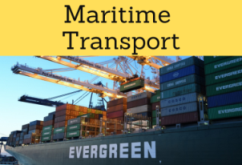
- Introduction to the Maritime Transport
- Analysis of the International Maritime Trade
- BIC (Containers)
- Chicago Convention (ICAO)
- International Maritime Organization
- International Chamber of Shipping
- Regular lines and charters
- Freight and Maritime Transport Costs. Insurance
- Maritime Transport Agents
- Maritime Transport Documentation.
- Bill of Lading (B/L)
- Electronic FIATA Bill of Lading (eFBL Bill of Lading)
- Main ports of the world
- Asia-Africa Corridor
- Legislation related to the International Maritime Transport
The objectives of the subject “International Maritime Transport” are the following:
- To understand the importance of the Maritime Transport in International Trade
- To understand the operation of the Maritime Transport
- To know the key players of the Maritime Transport of goods
- To understand the role of the main institutions related to the Maritime Transport (International Maritime Organization, International Chamber of Shipping)
- To know the key concepts related to the Marine Transport of goods (freight, safety, stowage, risks, insurances...)
- To examine the different concepts related to tje insurance and the main clauses of the Maritime Transport
- To analyze the documents related to the Maritime Transport (Bill of Lading) and how to fill them out
- To study the main rules and conventions of the maritime cargo transport (Rotterdam, Hamburg, FAL Rules)
Air Transport (4 ECTS)
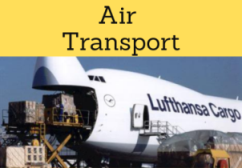
- Introduction to the Air Cargo Transport
- International Civil Aviation Organization (ICAO). Chicago Convention
- Convention for the Unification of Certain Rules for International Carriage by Air
- IATA
- Insurance and costs of the International Air Transport
- Loading devices for the Air Transport
- AWB Document (Air Waybill). e-AWB
- The global air transport market
- World's largest airports
The objectives of the subject “International Air Transport” are the following:
- To understand the importance of the Air Transport in International Trade
- To learn about the role of the International Civil Aviation Organization (ICAO) and the International Air Transport Association (IATA)
- To understand the global air cargo supply chain
- To analyze the documentary flow and documents related to the Air Cargo Transport (Air Waybill, e-AWB) and how to fill them out
- To study the main Conventions related to the International Air Transport
- To know the global situation of the International Air Transport
International Road Transport (10 ECTS)

- Introduction to the Road Transport
- International Road Transport Union
- Safe Load Securing for Road Transport
- Convention on the Contract for the International Carriage of Goods by Road
- Consignment Note (CMR)
- TIR Convention
- TIR Carnet
- Costs and insurance of the Road Transport

- Almaty-Bishkek Corridor
- Bangladesh-Myanmar Corridor
- China-Russia Corridor
- China-Pakistan Corridor
- China-Central-West Asia Corridor
- India-Afghanistan Corridor
- Europe-Caucasus-Asia Corridor
- Corridor of the Ashgabat Agreement
- Trans-Siberian Railway (Russia, North Korea)
- North-South Corridor (India-Russia)
- Afghanistan-Turkey Corridor
- Trans-Caspian Corridor
- East-West Corridor (Myanmar-Vietnam)
- Kyrgyzstan-Iran Corridor
- Islamabad-Tehran-Istanbul Rail and Road Corridor
- Nanning-Singapore Corridor
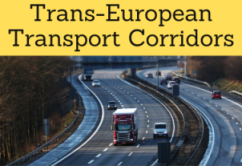
- Atlantic Corridor
- Baltic-Adriatic Corridor
- North Sea-Baltic Corridor
- North Sea-Mediterranean Corridor
- Mediterranean Transport Corridor
- Eastern Europe-Eastern Mediterranean Transport Corridor
- Scandinavian-Mediterranean Transport Corridor
- Rhine-Alpine Transport Corridor
- Rhine-Danube Transport Corridor
- Strasbourg-Danube Transport Corridor
- Pan-European Corridor II
- Pan-European Corridor IX
The objectives of the subject “International Road Transport” are the following:
- To understand the importance of the Road Freight transport in International Trade
- To understand the role of the International Road Transport Union (IRU)
- To know how stow safely a load to be transported by a lorry
- To know the key players and the market of the international road freight transport
- To learn the key concepts related to International Transport by road (cost, insurances, risks...)
- To study the main Conventions (CMR, TIR) of the International Road Transport of goods
- To analyze the documents related to the Road Transport (Consignment Note, e-CMR) and how to fill them out
Rail freight transport (5 ECTS)
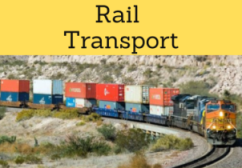
- Introduction to the Rail Transport
- International Rail Transport Committee(CIT)
- International Union of Railways
- Intergovernmental Organization for International Carriage by Rail. COTIF Convention (Rail)
- Organization for Cooperation between Railways (OSJD)
- Costs and insurance of the Rail Transport
- Rail Transport Document: Consignment Note
- Economy and railway operations
- CIM, CIT Rail Rules
- Rail transport in Africa
Eurasian Rail Corridors:
- Introduction to the Eurasian rail cargo transport
- Trade volume distribution between the Northern and Southern routes
Combined Transport in Europe
- Rail/Road combined transport in Europe
- General framework and key elements of the Combined Transport in Europe
- The European rail/road combined transport market
The objectives of the subject “International Rail Transport” are the following:
- To understand the importance of the Rail Transport in International Trade
- To analyze the pillars of the International Rail Transport Law
- To understand the role of the International Rail Transport Committee and the Intergovernmental Organization for International Carriage by Rail (OTIF)
- To know the key players and concepts of the Rail Freight transport
- To analyze the documents related to the Rail Transport (CIM Consignment Note) and how to fill them out
- To study the main Conventions related to the Rail Transport of goods (COTIF Convention, CIM, OSJD)
Multimodal / Combined Transport (5 ECTS)
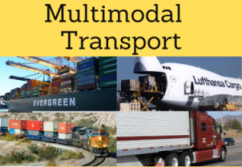
- Introduction to the Multimodal / Combined Transport
- Intermodal Transport Chain
- Multimodal Transport Operator
- Intermodal Loading Units (ILU)
- Road-Rail Combined Transport
- United Nations Convention on International Multimodal Transport of Goods (Geneva, 1980)
- United Nations Convention on Contracts for the International Carriage of Goods Wholly or Partly by Sea (Rotterdam Rules)
- Combined Transport Bill of Lading (CTBL) of the FIATA
- Insurance and costs of the Multimodal Transport
The objectives of the subject “Multimodal / Combined Transport” are the following:
- To understand the importance of the Multimodal Transport in International Trade
- To learn the key concepts related to the Multimodal transport (Intermodal Transport Units, Multimodal Transport Operator...)
- To know the role of the FIATA
- To analyze the Multimodal / Combined Transport Chain and the key players
- To study the main Conventions related to the Multimodal/Combined Transport
- To know the features of the Road-Rail Combined Transport
- To analyze the documents related to the Multimodal/Combined Transport of goods (Combined Transport Bill of Lading)

International Payment Methods. Documentary Credits (4 ECTS)
- Introduction to the International Payment Methods
- Documentary Collections
- The importance of the Documentary Credits in Foreign Trade
- Letter of credit
- Types, modalities and variants of the Documentary Credits
- Analysis of the contents of a letter of credit
- Analysis of the Documentary Credits
- UCP 600
- E-UCP
- United Nations Conventions related to the International Payment Methods;
- United Nations Convention on Independent Guarantees and Stand-by Letters of Credit
- United Nations Convention on International Bills of Exchange and International Promissory Notes
- United Nations Convention on the Transfer of Credits in International Trade
- UNCITRAL Model Law on International Credit Transfers
The objectives of the subject “Documentary Credits and International Payment Methods” are the following:
- To analyze the different Payment Methods used in International Trade
- To understand the fundamental role of the Documentary Credits in International Trade as well as their operation and modalities
- To know how to manage a foreign trade operation through a documentary credit
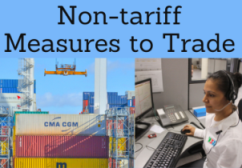
Non-tariff Measures (4 ECTS)
- Introduction to the Non-tariff Measures in Foreign Trade
- Technical Barriers to Trade
- Pre-shipment Inspection
- Sanitary and Phytosanitary Measures
- Contingent trade-protective measures (Anti-dumping Measures, Safeguards)
- Non-automatic Import licensing, quotas and prohibitions
- Price control measures, including charges and additional taxes
- Other non-tariff measures (financial, investment, distribution, public procurement, rules of origin, exports...)
The objectives of the subject “Non-tariff Measures” are the following:
- To know how to identify and distinguish the non-tariff measures (technical and non-technical) in Foreign Trade
- To evaluate the possible impact they may have on the Foreign Trade
- To know how to act before a non-tariff measure implemented by a government
- To familiarise the student with the use of the “International Classification Manual of Non-Tariff Measures” of UNCTAD

Trade Facilitation (2 ECTS)
- Introduction to the foreign trade facilitation programs
- Trade Facilitation Agreement
- Convention Harmonization of Frontier Controls of Goods
- Convention Harmonization of Frontier Controls of Goods
- Global System of Trade Preferences
- Trade Negotiations Among Developing Countries
- Potential gains of the trade facilitation
- The pillars of the trade facilitation (transparency, simplification, harmonization, standardization)
- The global supply chain and the trade facilitation
- Buy-Ship-Pay Model (CEFACT / ONU)
- Main Domains of trade facilitation (purchases, transport, customs, payments)
- Trade facilitation and international transport
The objectives of the subject “Trade Facilitation” are the following:
- To understand the fundamentals of the trade facilitation programs
- To learn the WTO Agreement on Trade Facilitation
- To analyze the impact of the trade facilitation programs in the global supply chain
 Master en Transport International
Master en Transport International  Master en Transporte internacional
Master en Transporte internacional  Mestrado em Transporte Internacional.
Mestrado em Transporte Internacional.
(c) EENI Global Business School (1995-2024)
We do not use cookies
Top of this page



